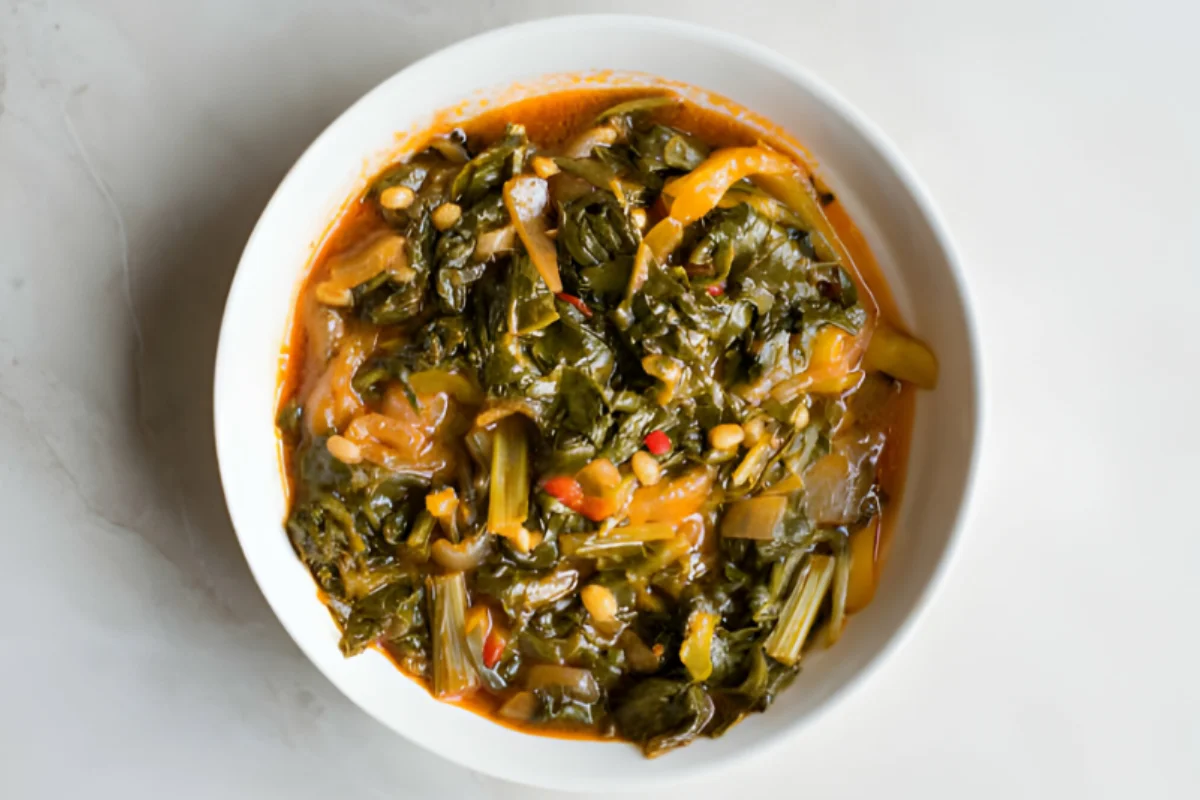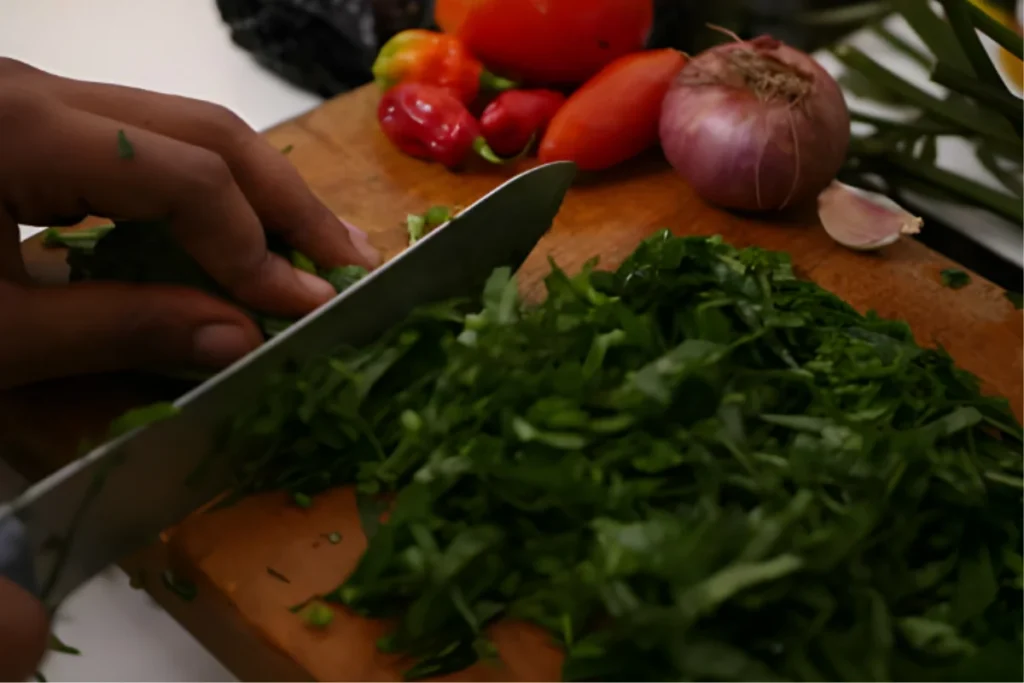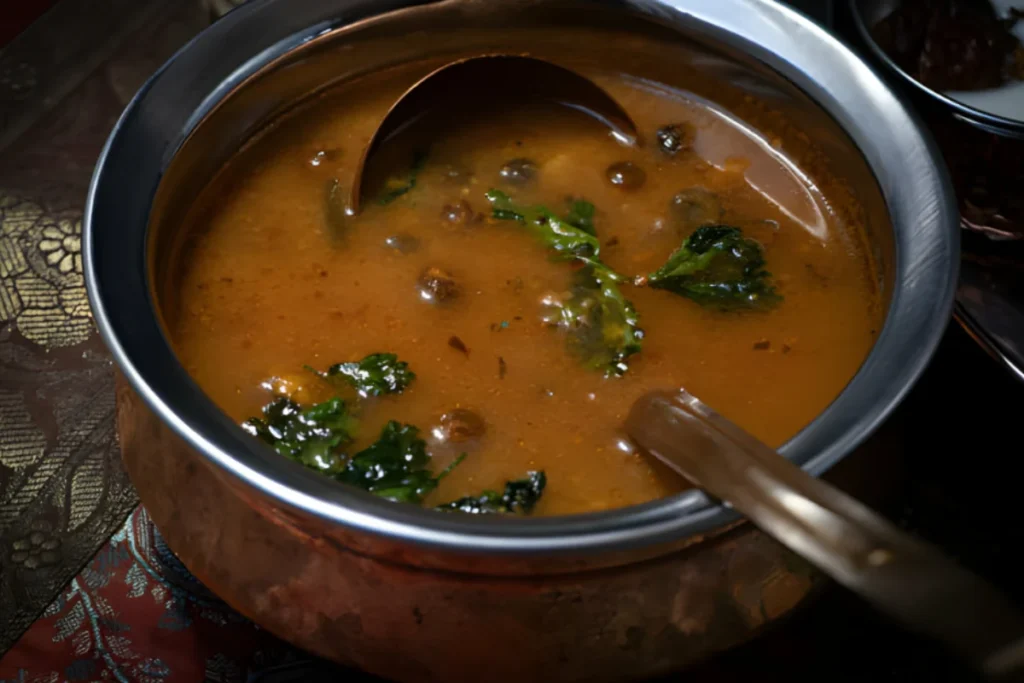Nigerian cuisine is a vibrant and flavorful testament to the country’s rich cultural heritage. At the heart of this culinary tradition lies the Nigerian vegetable soup, a staple dish known for its nutritious ingredients and diverse flavors. This soup, varying from region to region, embodies the essence of Nigerian cooking, bringing together a harmonious blend of leafy vegetables, proteins, and spices.
Interestingly, the term “Nigerian vegetable soup” can refer to different recipes across Nigeria’s many ethnic groups. For example, the Igbo people’s Ofe Owerri and the Efik’s Edikang Ikong soup each offer unique tastes and ingredients. These variations highlight the adaptability and creativity inherent in Nigerian cooking.
The foundation of Nigerian vegetable soup includes a generous use of Ugwu (fluted pumpkin leaves) and Waterleaf, alongside a variety of meats and fish, seasoned with local spices. This not only makes the dish a hearty and satisfying meal but also packs it with essential vitamins and minerals. The health benefits of these ingredients, such as improved immunity and blood production, are significant. For those interested in the broader context of Nigerian soups and their cultural significance, an article by Akintunde Damilare on LinkedIn offers valuable insights.
Nigerian vegetable soup is more than just a meal; it’s a celebration of Nigerian heritage, a testament to the country’s rich biodiversity, and a crucial part of a balanced diet.
Understanding Nigerian Vegetable Soup
Understanding Nigerian vegetable soup requires delving into its rich tapestry of flavors, ingredients, and cultural significance. This dish is not just food; it’s a narrative of Nigeria’s heritage, diversity, and culinary innovation. For readers interested in exploring more comforting and hearty meals, the article on Hearty Cowboy Soup Recipe: A Comforting One-Pot Meal offers a delightful read, showcasing another soup variety that warms the heart and soul.
-
What is Nigerian Vegetable Soup?
- At its core, Nigerian vegetable soup is a hearty, nutritious dish. It’s celebrated across the nation for its health benefits and rich taste.
- Known by various names across different tribes, it reflects Nigeria’s cultural diversity. Edikang Ikong, Afang, and Ofe Owerri are just a few examples.
-
Key Ingredients of Nigerian Vegetable Soup
- The soup’s foundation lies in its use of leafy vegetables such as Ugwu (fluted pumpkin leaves) and Waterleaf. These greens are not just for flavor; they’re packed with vitamins and minerals.
- Proteins like goat meat, smoked fish, and shrimp add depth and richness to the soup, making it a balanced meal.
- Essential spices and seasonings, including cayenne pepper, bouillon cubes, and ground crayfish, give the soup its distinctive flavor.
- Other ingredients like palm oil, onion, water, and stock are crucial for achieving the soup’s unique texture and taste.
-
Nutritional Value
- The ingredients in Nigerian vegetable soup offer a range of health benefits. For instance, Ugwu leaves are known for their high vitamin A content, which is essential for good vision and immune function.
- The soup is a good source of protein from its meat and fish, supporting muscle growth and repair.
- Its use of spices not only enhances flavor but also provides dietary fiber and antioxidants, contributing to overall health and well-being.
- Those curious about incorporating healthy greens in their diets might find the Easy Chicken Salad Chick Broccoli Salad Recipe insightful, providing a fresh perspective on using vegetables creatively.
Nigerian vegetable soup stands as a testament to the country’s rich agricultural landscape and culinary traditions. It showcases the versatility of local ingredients, transformed through simple yet innovative cooking methods into a dish that nourishes the body and delights the palate. This soup is more than just a meal; it’s a celebration of Nigerian culture, a staple of its cuisine, and a beloved dish that brings families and communities together.
How to Make Nigerian Vegetable Soup
Making Nigerian vegetable soup is an art that combines traditional ingredients with culinary skills to create a flavorful and nutritious dish. Here’s a step-by-step guide to crafting this beloved soup, highlighting the simplicity and richness of Nigerian cuisine.
Preparation of Ingredients
- Select Fresh Vegetables: The heart of the soup lies in its leafy greens. Choose fresh Ugwu (fluted pumpkin leaves) and Waterleaf for the best taste and nutritional value.
- Prepare Proteins: Clean and cut goat meat, smoked fish, and shrimp. These proteins add depth and richness to the soup.
- Gather Spices: Assemble cayenne pepper, bouillon cubes, ground crayfish, salt, and other spices. They are key to achieving the authentic flavor of the soup.
Cooking Process
- Cook the Goat Meat: Start by boiling the goat meat with onions, bouillon cubes, and a pinch of salt until tender. This creates a flavorful base for the soup.
- Prepare the Vegetables: While the meat cooks, wash and slice the vegetables. Draining them ensures they retain their texture when added to the soup.
- Combine Ingredients: In a large pot, add the cooked meat and its stock. Introduce the smoked fish, shrimp, and prepared spices. Allow them to simmer together, melding the flavors.
- Add the Vegetables: Introduce the Ugwu and Waterleaf to the pot. Stir gently to combine without overcooking the greens.
- Final Touches: Pour in palm oil for its distinctive flavor and color. Adjust the seasoning to taste and simmer until the oil is well integrated into the soup.
Serving Suggestions
- Nigerian vegetable soup pairs wonderfully with fufu, pounded yam, or rice. For a low-carb option, consider serving it with cauliflower rice.
This guide to making Nigerian vegetable soup showcases the blend of flavors and textures that define this dish. From the tender proteins to the fresh, vibrant greens, each ingredient plays a crucial role in creating a soup that’s both nourishing and satisfying. Whether you’re new to Nigerian cuisine or a seasoned aficionado, this soup is a testament to the country’s rich culinary heritage, offering a taste of Nigeria’s diverse flavors and traditions. Additionally, the exploration of soup recipes wouldn’t be complete without a dive into the Taco Soup with Ranch Dressing, presenting a fusion of flavors that resonate with the adventurous spirit of Nigerian Vegetable Soup.
FAQs on Nigerian Vegetable Soup
What are the best leafy greens to use if I can’t find Waterleaf or Ugwu leaves?
- If Waterleaf or Ugwu leaves are unavailable, spinach and kale are excellent substitutes. They mimic the texture and nutritional profile closely, ensuring your soup remains authentic in taste and health benefits.
Can I use other types of meat or fish in Nigerian vegetable soup?
- Absolutely! While goat meat, smoked fish, and shrimp are traditional, you can use beef, chicken, or any dried fish available to you. The key is to ensure the meat or fish is well-seasoned and cooked until tender.
How can I make Nigerian vegetable soup spicier or less spicy?
- To adjust the spice level, modify the amount of cayenne pepper or add scotch bonnet peppers for extra heat. For a milder soup, reduce the pepper and focus on the rich flavors of the other spices and ingredients.
What accompaniments go well with Nigerian vegetable soup?
- Nigerian vegetable soup is traditionally served with starchy sides like fufu, pounded yam, garri, or rice. For a low-carb alternative, cauliflower rice or keto fufu are great options.
How long can I store Nigerian vegetable soup, and how do I reheat it?
- The soup can be stored in the refrigerator for up to 5 days or frozen for up to 2 months. To reheat, thaw if frozen, then warm on the stove over low heat, adding a little water if necessary to prevent sticking.
Is Nigerian vegetable soup suitable for a vegetarian or vegan diet?
- The traditional recipe includes meat and fish, but it can be adapted for vegetarian or vegan diets by omitting these proteins and using vegetable stock. You can also add more varieties of vegetables or tofu for protein.
Can Nigerian vegetable soup be made ahead of time?
- Yes, making the soup ahead of time can actually enhance its flavors as the ingredients meld together. Just be sure to store it properly in the refrigerator or freezer and reheat gently.
Are there any health benefits to eating Nigerian vegetable soup?
- Nigerian vegetable soup is rich in vitamins, minerals, and antioxidants, thanks to its use of fresh leafy greens and other vegetables. It’s also a good source of protein from the added meats and fish, making it a balanced and nutritious meal option.
Conclusion
In conclusion, Nigerian vegetable soup is not just a dish; it’s a vibrant celebration of Nigeria’s rich culinary heritage. This soup, with its blend of nutritious leafy greens, hearty proteins, and aromatic spices, offers a taste of Nigeria’s diverse flavors and traditions. It embodies the essence of Nigerian cooking, showcasing the importance of fresh, local ingredients and the joy of sharing a delicious meal with family and friends.
Whether you’re exploring Nigerian cuisine for the first time or you’re a seasoned aficionado, Nigerian vegetable soup provides a delightful culinary experience. Its versatility allows for various adaptations, making it suitable for different dietary preferences and available ingredients. Moreover, its nutritional benefits make it a wholesome choice for anyone looking to enjoy a balanced and flavorful meal.
As we’ve seen, preparing Nigerian vegetable soup is an art that combines simplicity with rich flavors. It invites cooks of all levels to experiment with ingredients and techniques, creating a dish that’s both satisfying and nourishing. The soup’s ability to bring people together, transcending cultural and geographical boundaries, is a testament to its enduring appeal.
So, whether you’re drawn to its health benefits, intrigued by its cultural significance, or simply looking for a delicious meal, Nigerian vegetable soup is a dish that promises to enrich your culinary journey. It’s a warm, welcoming invitation to experience the heart and soul of Nigerian cuisine, one spoonful at a time.


